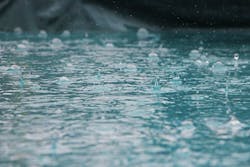Michigan Community Will Landscape to Keep Storm Water Pollution Out of St. Marys River
High school students, community groups and Lake Superior State University are planning to use landscaping to reduce storm water pollution flowing into the St. Marys River, which separates Michigan from Ontario, Canada.
According to Spartan Newsroom, the project received $250,000 from the U.S. Forest Service as part of the Great Lakes Restoration Initiative. This is a program that protects Great Lakes drinking water and habitats. The project is expected to begin summer 2021.
The university’s project will use soil and native plants to collect and filter out pollutants before runoff reaches the river, according to Ashley Moerke, director of the university’s Center for Freshwater Resources and Education, reported Spartan Newsroom.
The university is building the center on a former industrial site, which has shown contamination with pollutants.
“Part of us being an old city with a lot of former industrial development is that we no longer have those natural features,” Moerke said, reported Spartan Newsroom. “It is a really simple mechanism. It’s creating depression areas and planting (them) with native plants that absorb (storm water). It’s not this complicated idea, but it’s something that we’ve really moved away from.”
The landscaping will surround the proposed Richard and Theresa Barch Center for Freshwater Research and Education building, which will house research labs, teaching labs and a visitor center.
A Forest Service priority for the site is advancing green infrastructure to reduce pollutant runoff from degraded sites, according to Sheela Johnson, Great Lakes Restoration Initiative grant program manager for the Forest Service, reported Spartan Newsroom.
High school and college students, youth groups and the Chippewa Luce Mackinac Conservation District will help the university begin planting in late August and into September.
The Forest Service will begin accepting grant applications for the Great Lakes Restoration Initiative again spring 2021.


